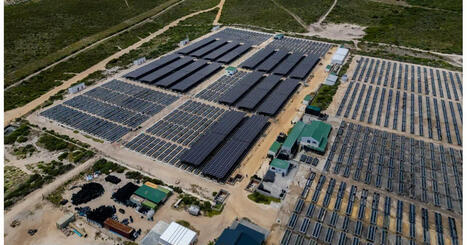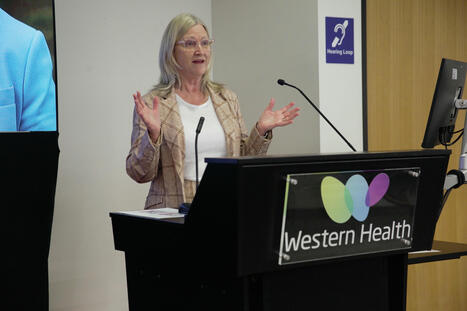 Your new post is loading...

|
Scooped by
EcoVadis
June 17, 2:27 AM
|
IN recognition of World Ocean Day, observed annually on 8 June, the Sea Harvest Group reaffirms its commitment to sustainable fishing practices and to preserving the health of the world’s oceans. As an organisation whose operations are intrinsically linked to the ocean, Sea Harvest is dedicated to ensuring that marine resources continue to benefit both South Africa and future generations.

|
Scooped by
EcoVadis
April 25, 2:30 AM
|
Bupa has launched a new report designed to support the healthcare sector to reduce its environmental impact.
The report, a collaboration between Bupa Global, India & UK (BGIUK), The University of Manchester and The Tyndall Centre for Climate Change Research, aims to tackle the issues faced by the healthcare sector, currently responsible for almost 5% of global greenhouse gas emissions.
The report explores the financial, operational and logistical challenges of reducing organisations’ environmental footprints, plus opportunities to reduce emissions, update clinical practices to reduce environmental impact, engage employees and work with supply-chains.
Included is a showcase of best practice from hospital and technology providers, NHS trusts, insurers and industry and sustainability associations. It adds to a growing body of work and pulls together best practice examples with practical actions for healthcare providers.

|
Scooped by
EcoVadis
April 25, 2:28 AM
|
In today’s rapidly evolving healthcare landscape, sustainability has emerged as a critical focal point, particularly in industries reliant on plastic packaging. With billions of pounds of healthcare plastics being produced annually, the environmental impact of single-use plastics in the medical sector is undeniable. As the global community shifts towards more sustainable practices, the medical device and pharmaceutical sectors are facing increasing pressure to address their environmental footprint.

|
Scooped by
EcoVadis
April 25, 2:27 AM
|
Revolutionizing Healthcare with AI
The healthcare sector is undergoing significant transformations, with technology at the forefront. Enbasekar D, Co-founder & CTO of MediBuddy, shares insights into how AI-powered tools are enhancing patient-centric care.
“Artificial Intelligence, particularly advanced language models like Llama and GPT-4, are revolutionizing healthcare interactions. These AI-powered tools can provide preliminary medical information, answer health-related questions, and offer preliminary guidance based on symptoms. While not replacing medical professionals, they serve as valuable first-line resources for health information and initial assessments.” says Enbasekar.

|
Scooped by
EcoVadis
April 25, 2:25 AM
|
A new virtual laboratory, which will gather insights into the healthcare industry’s environmental footprint to accelerate sustainable solutions, was launched today.
The University of Melbourne-led Healthcare Carbon Lab, at Western Health, will measure the environmental impacts and costs of common single-use items and medical equipment compared to reusable alternatives.
Project lead and Associate Dean of Healthcare Sustainability in the Faculty of Medicine, Dentistry and Health Sciences, Associate Professor Forbes McGain, said the lab will track and calculate the energy for the creation, use and disposal of medical equipment used in hospitals every day.
Associate Professor McGain, who is also an intensive care doctor at Western Health, said the lab will accelerate the long history of collaborating with University of Melbourne engineers to research and improve the efficiency of hospital energy use.
“It is well-documented Australia’s healthcare system contributes 7% of Australia’s carbon emissions, but what we need is more of the data to be able to understand how we can make better, more sustainable choices while keeping patient care front of mind,” Associate Professor McGain said.

|
Scooped by
EcoVadis
April 25, 2:24 AM
|
Bupa is working to reduce the environmental impact of the healthcare sector by addressing the use of single-use items (SUIs).
The healthcare sector contributes 4.4% of global emissions and generates millions of tonnes of waste annually, a significant share of which comes from disposable medical products.

|
Scooped by
EcoVadis
April 25, 2:21 AM
|
Nowadays, it is hard to go a day without hearing about sustainability, the environment, and the climate crisis.
But it wasn’t always that way—and we didn’t always have ways to track the environmental impacts of different sectors, much less tackle them.
“In the field of health care, sustainability was a hidden priority,” said alum Mellissa Nguyen MAITP/MBA ’09, senior program manager of environmental sustainability at Vizient, the largest healthcare process improvement organization in the U.S. “Health care’s main focus was on keeping hospitals open and delivering patient care.”
However, the U.S. healthcare sector has a huge impact on the environment. The industry produces roughly 1.7 million tons of plastic waste every year. If the U.S. healthcare industry were its own country, it would be the seventh largest emitter of greenhouse gases in the world.
“It’s more than the emissions from furnaces and ambulances,” Nguyen said. “It’s the products and services used to deliver patient care, which includes personal protective equipment, anesthetic gases, food, surgical tools, electronics, lab equipment, paint on the walls. Everything has an environmental impact, which, in turn, has an impact on the health of the community.”

|
Scooped by
EcoVadis
April 25, 2:19 AM
|
Diagnostic tests inform 70-80% of healthcare decisions. They also account for a significant portion of the sector’s waste and carbon footprint. With the environmental impact of healthcare facing greater scrutiny, there’s a strong case for enhancing R&D with sustainability considerations. Handled well, this can have a positive impact across both environmental and commercial performance.
As the sector starts to consider sustainability alongside patient safety, there are new commercial opportunities for companies that can strike an effective balance.

|
Scooped by
EcoVadis
April 25, 1:49 AM
|
Ireland’s food industry could be part of the solution to the health and sustainability crisis in our food system, but are trailing international counterparts, according to a report published today by researchers at University College Cork’s (UCC) School of Public Health.
UCC researchers examined statements 35 companies make publicly, for example on their websites or in their annual reports, relating to product formulation, nutrition labelling, and marketing for the nutrition assessment. In the sustainability assessment, the focus is on statements relating to factors such as emissions, packaging, food waste, water use, and product portfolio. The results are contained in Ireland’s first ever report on Business Impact Assessment (BIA) on Obesity and Population-level Nutrition and Business Impact Assessment on Sustainability.

|
Scooped by
EcoVadis
April 25, 1:38 AM
|
Manufacturers must also consider how the environmental impact of their food production is shaping consumer behaviour. Now more than ever, consumers are prioritising sustainability when purchasing: 85% of consumers globally say they are experiencing the disruptive impacts of climate change, and 46% say they buy more sustainable products to reduce environmental impact.⁵
One way that consumers are prioritising sustainability is by incorporating plant-based products into their diets. Research shows that a vegan diet can produce a carbon footprint that is up to 60% smaller than a meat-based diet.⁶
“One of the biggest misconceptions is that taste, health and sustainability are in conflict with each other. This is likely due to formulation challenges where one ingredient may offer a high source of protein, but could also produce undesirable off-flavours, compromising taste as a result.

|
Scooped by
EcoVadis
June 20, 2024 3:23 AM
|
The EU Council has reached a political agreement to more closely scrutinize soil health monitoring across member states, providing guidelines to manage soil sustainably and identify situations where soil contamination poses health and environmental risks.
The proposed soil monitoring law requires member states to monitor and assess the health of soil in their territory so that landowners and authorities across the EU can take appropriate sustainable soil management measures.
Healthy soil is essential for food production, with as much as 95% of the food is produced directly or indirectly on soil. However, estimates say that over 60% of the soils in the EU are not in good condition.
Covid-19 created the perfect storm for the pharma industry’s already challenged supply chain network. The pandemic augmented supply chain risk and exposed weak areas such as the lack of end-to-end visibility. That’s an observation from Daniel Carchedi, Senior Director of Business Development and Strategy, Microsoft Health and Life Sciences.
Carchedi led a panel discussion, “Digital ecosystems and how to future proof supply chains,” on how tech companies, such as Microsoft and Accenture, are closely collaborating with the pharma industry as they seek to repair and improve manufacturing supply chain issues exposed by the Covid-19 pandemic.

|
Scooped by
EcoVadis
September 16, 2022 8:43 AM
|
Samsung has announced its environmental sustainability plans for the future. The company has formulated a new strategy to achieve net zero carbon emissions and increase the use of renewable energy. It is also planning to invest in new technologies to develop energy-efficient products.
Samsung is aiming to achieve net zero carbon emissions by 2050
At the heart of today’s announcement is Samsung’s net zero carbon emission target. The Korean behemoth is aiming to achieve that for all operations in the Device Experience (DX) division by 2030. It includes operations across smartphones, displays, digital appliances, network equipment, and Health & Medical-related businesses.
|

|
Scooped by
EcoVadis
April 25, 2:31 AM
|
Over the last decade, there has been altered disease patterns, with rising heat and air pollution-related illnesses and increased vector borne diseases among other issues. While the health professionals and the sector have had a ringside view of how these changes are impacting human health, the realisation of the impact of the healthcare sector on global emissions had never been this profound.
The pursuit of sustainability and decarbonization in healthcare is critical, requiring a deep understanding of emission sources within hospitals.
A recent report shows the global health sector contributes 5.2% of global emissions (2.7 GtCO2e) while representing 10% of global GDP. Its heavy use of anaesthetic gases, single-use plastics, biomedical waste generation, and slow shift to renewable energy worsen this issue. As health services expand globally, emissions are expected to rise, heightening the sector's environmental impact in the future.

|
Scooped by
EcoVadis
April 25, 2:29 AM
|
In the ever-evolving realm of healthcare, the connection between human health and environmental health has emerged as a key concern. Across the Asia-Pacific region, where 70 per cent of the 6.5 million annual global deaths from air pollution occur, the impact of climate change on public health looms large.
For instance, extreme weather events as well as rising temperatures and carbon dioxide levels increase cardiovascular risks and threaten vulnerable communities disproportionately. What’s more, the Organisation for Economic Cooperation and Development reports that the healthcare sector contributes 4.4 per cent to global nett emissions, utilises 10 per cent of all extracted raw ma

|
Scooped by
EcoVadis
April 25, 2:27 AM
|
Faced with ongoing staff shortages and growing patient demand, healthcare organizations around the world are being compelled to rethink how and where they deliver care. There is also a growing recognition of the importance of reducing the sector’s environmental impact. These 10 healthcare technology trends highlight the potential of innovation to help deliver better care to more people, in a sustainable way.

|
Scooped by
EcoVadis
April 25, 2:26 AM
|
Materials suppliers and distributors for the medical plastics market are sticking with sustainability and nearshoring trends as they address demand for PFAS-free, bio-based and monomaterial solutions.

|
Scooped by
EcoVadis
April 25, 2:24 AM
|
99% of healthcare leaders in APAC say reducing the environmental impact and CO2 emissions of the industry should be top priorities for healthcare organizations, higher than global (86%)
Healthcare leaders in APAC are driving change through a range of strategies, such as using virtual care technologies/remote monitoring to reduce emissions, and they are looking at adopting even more sustainable practices in the next three years
Philips showcasing a range of sustainable solutions at RSNA 2024, including precision imaging innovations that will revolutionize care for patients while reducing environmental impact

|
Scooped by
EcoVadis
April 25, 2:22 AM
|
In this Q&A, Eastman’s Katherine Hofmann explores the vital connection between sustainability and healthcare. She highlights the importance of medical plastics in achieving sustainability goals, discussing challenges, regulations, and emerging solutions. Her insights offer a comprehensive overview of ongoing efforts to advance sustainability in healthcare, with a focus on medical packaging and patient safety.

|
Scooped by
EcoVadis
April 25, 2:20 AM
|
The healthcare industry has a responsibility to step up to address climate change, and the power to drive meaningful change. By collaborating with partners, together we can drive sustainable healthcare to benefit both the environment and the health of future generations. Leaders from several healthcare organizations share their firsthand experiences with sustainability.

|
Scooped by
EcoVadis
April 25, 2:19 AM
|
The World Health Organization (WHO), through its Department of Regulation and Prequalification, has issued a call for action to drive sustainability in the pharmaceutical sector. Entitled “Greener pharmaceuticals’ regulatory highway,” this initiative underscores the urgent need for innovative regulatory practices to reduce the environmental footprint of medical products while maintaining high standards of safety and efficacy. “Addressing the environmental impact of healthcare products is no longer optional – it is imperative,” said Dr Yukiko Nakatani, WHO Assistant Director-General for Access to Medicines and Health Products. “The transformation of regulatory practices will be pivotal in shaping a pharmaceutical industry that meets today’s health needs without compromising the planet’s future.” As climate change continues to exacerbate health risks worldwide, modern health systems, contributing to approximately 5% of global carbon emissions, must prioritize sustainability. This call for action urges global regulatory bodies and stakeholders in the pharmaceutical and healthcare industries to adopt innovative practices that prioritize sustainability and reduce environmental impact.

|
Scooped by
EcoVadis
April 25, 1:42 AM
|
This year’s ten top trends for 2025 have a particular focus on sustainability, health and nutrition, according to Whole Foods Market annual survey.
The forecasted trends for next year include a surge in hydrating ready-to-drink beverages, new aquatic ingredients within the plant-based category, crunchy textures and fusion snack foods with international flavors.
This is Whole Foods’ tenth year releasing its trends report, which not only reflects “growing consumer preferences but also pushes the boundaries of what’s possible for the world of food

|
Scooped by
EcoVadis
December 12, 2024 3:23 AM
|
Today’s (10 Dec) entry into force of the revised Regulation on Classification, Labelling and Packaging of Chemicals (CLP) marks a significant milestone in the protection of human health and the environment.
It will also strengthen the internal chemicals market, paving the way for a more competitive and sustainable chemical industry.
The revised CLP Regulation ensures clear chemical labelling, particularly for online sales, and introduces simpler and clearer requirements so that chemicals can move freely across the EU.

|
Scooped by
EcoVadis
February 28, 2024 2:33 AM
|
Imagine a future where every dollar invested in infrastructure not only generates economic value but also contributes directly to the health of our planet. Vossloh AG, a titan in the rail industry, is making this vision a reality. On February 22, 2024, the company announced a groundbreaking syndicated loan agreement that not only secures its financial future but also ties its fate to the company's environmental, social, and governance (ESG) performance. This bold move could redefine how corporations approach financing, making sustainability a cornerstone of economic success.

|
Scooped by
EcoVadis
May 5, 2023 2:24 AM
|
PVH, owner of Calvin Klein and Tommy Hilfiger, recently teamed up with Standard Chartered Bank to create a new financing program for suppliers tied to the apparel company’s sustainability goals.
Under the program, PVH suppliers can finance day-to-day operations through a facility benchmarked to PVH’s metrics on environmental and social goals. Suppliers that meet certain standards can get discounted financing.
Suppliers will be benchmarked on metrics around PVH’s environmental goals as well as those related to health, safety, forced labor, child labor and harassment and abuse at their manufacturing sites.
|
 Your new post is loading...
Your new post is loading...































